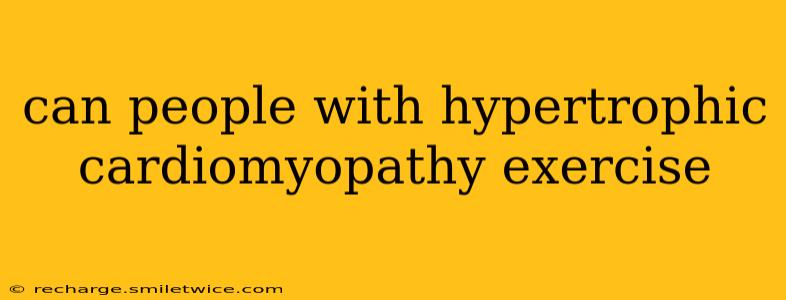Hypertrophic cardiomyopathy (HCM) is a condition where the heart muscle thickens, making it harder for the heart to pump blood efficiently. This raises concerns about exercise, as physical exertion increases the heart's workload. The short answer is: yes, people with HCM can exercise, but it's crucial to do so safely and under the guidance of a medical professional. The type and intensity of exercise will vary greatly depending on the severity of the condition and the individual's overall health.
What Kind of Exercise is Safe for People with HCM?
The key is to find an exercise regimen that's appropriate for your specific situation. This isn't a one-size-fits-all answer. A cardiologist specializing in HCM will work with you to create a personalized plan. This plan often involves:
- Gradual Progression: Starting slowly and gradually increasing the intensity and duration of exercise is crucial. Rushing into strenuous activity can put unnecessary strain on the heart.
- Low-Impact Activities: Low-impact exercises such as walking, swimming, and cycling are often recommended as they are gentler on the heart than high-impact activities like running or weightlifting.
- Regular Monitoring: Regular check-ups with your cardiologist, including ECGs and possibly echocardiograms, are essential to monitor your heart's response to exercise. This allows for adjustments to your exercise plan as needed.
- Avoiding Competitive Sports: Competitive sports that involve intense exertion and sudden bursts of activity are generally discouraged, especially in those with more severe HCM. This is because sudden increases in heart rate and blood pressure can be dangerous.
- Listening to Your Body: Pay close attention to how your body feels during exercise. If you experience chest pain, shortness of breath, dizziness, or excessive fatigue, stop immediately and consult your doctor.
What Exercises Should People with HCM Avoid?
Certain exercises should be avoided or approached with extreme caution:
- High-intensity Interval Training (HIIT): The intense bursts of activity in HIIT can place significant stress on the thickened heart muscle.
- Weightlifting (heavy): While some light weight training might be acceptable with medical supervision, heavy weightlifting is generally avoided as it can drastically increase blood pressure.
- Competitive Sports: As mentioned above, competitive sports that demand intense and unpredictable physical effort are usually not advised.
Can Exercise Worsen Hypertrophic Cardiomyopathy?
While carefully managed exercise can be beneficial, intense or improper exercise can potentially worsen HCM. This is why medical supervision is critical. Improper exercise can lead to:
- Increased risk of arrhythmias: Abnormal heart rhythms can be triggered by intense physical activity.
- Heart failure: In severe cases, excessive exertion can contribute to heart failure.
- Sudden cardiac death: Although rare, this is a serious risk in individuals with HCM, particularly those who engage in strenuous activity without medical guidance.
How Does Exercise Benefit People with HCM?
Despite the risks, appropriately managed exercise can offer several benefits:
- Improved Cardiovascular Health: Regular, moderate exercise can help improve overall cardiovascular health, including blood pressure and cholesterol levels.
- Weight Management: Maintaining a healthy weight can reduce strain on the heart.
- Increased Energy Levels: Many people with HCM report increased energy levels and improved quality of life with a tailored exercise program.
- Improved Quality of Life: Exercise can help alleviate stress and improve overall mental and physical well-being.
What are the Signs of Overexertion in HCM?
It's crucial to be aware of the signs of overexertion:
- Chest pain or tightness: This is a major warning sign.
- Shortness of breath: Difficulty catching your breath, even at rest, is concerning.
- Dizziness or lightheadedness: These symptoms suggest reduced blood flow to the brain.
- Excessive fatigue: Unusual tiredness that doesn't resolve with rest.
- Palpitations: A racing or irregular heartbeat.
Disclaimer: This information is for educational purposes only and does not constitute medical advice. Always consult with your cardiologist or healthcare provider to determine a safe and appropriate exercise plan for your specific situation. They will assess your individual risk factors and guide you in making informed decisions about physical activity. Never start a new exercise program without consulting a medical professional, especially if you have a condition like HCM.
